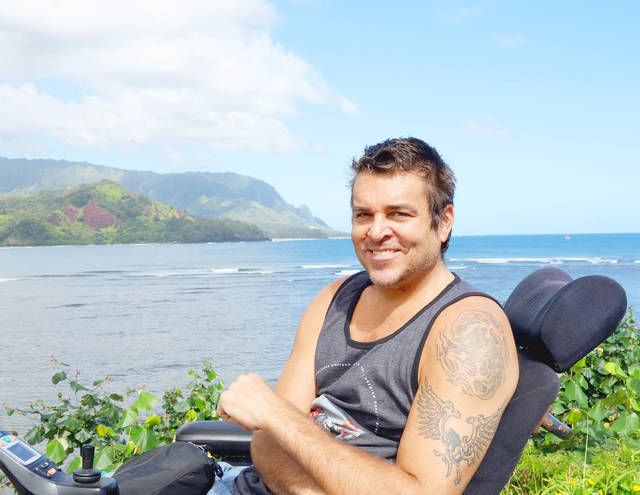PRINCEVILLE — Ever since the motorcycle accident that crushed his lumbar spine in 1993, Grover Inks’ legs have been numb. But recently, Inks has been suffering from an excruciating, near-relentless pain in his lower extremities. As he describes, it’s almost
PRINCEVILLE — Ever since the motorcycle accident that crushed his lumbar spine in 1993, Grover Inks’ legs have been numb. But recently, Inks has been suffering from an excruciating, near-relentless pain in his lower extremities. As he describes, it’s almost as if his legs are on fire. The pain is maddening and it rarely stops.
The burning sensation, according to Inks’ retelling of one doctor’s theory, is his brain’s response to its own failure to send neurological messages to the parts of his body that are deprived of feeling. These failed signals become amplified, and the brain interprets them as pain.
“It starts to feel hopeless at times because other times in life, if you work hard and try hard enough, you can usually beat things or overcome them,” Inks says. “It’s starting to feel like no matter what I do there’s no relief.”
Inks, 43, has been unable to walk since the accident that flipped his life upside down when he was 19. But the pain is a newer development — the result of a bitter and worsening neurological breakdown for which no doctor has been able to find a remedy.
These days it takes just about all the strength the single father can muster to play board games and make arts and crafts projects with his 11-year-old twin girls. On rare occasions they make it to the beach.
On days when his daughters are with their mother, Inks says he does little more than lie in bed, hoping to recuperate in time for the next visit with his kids.
“I’m not trying to sound like a weak guy, but I’m literally just in my room all the time,” says Inks, who receives government assistance and lives in Princeville. “My brain is constantly on overload because it’s being fed with this pain from my legs, which is this strange thing where I can’t feel my legs and yet they cause me tremendous pain all the time. When it comes to trying to keep everything else in life together, it gets to this point where it’s like, ‘OK, enough is enough.’ I turn off my phone, I lock my doors and I just have to lay here for a couple of days in order to get myself into a position where I can start fresh and try to handle it all again.”
Now another curveball: The wheelchair-accessible van Inks relies on to get around is on its last legs. In the last two years, Inks said he and his family have spent about $10,000 on repairs to the vehicle, which has a ramp, power doors and hand controls that allow Inks to drive without use of his legs. Inks says he can’t afford to continue to sink money into the decade-old Dodge van. He also can’t afford to buy a new one.
So Inks is stepping outside of his comfort zone and asking his family, friends and the greater Kauai community for help. Last month he launched a crowdfunding website through which he hopes to rise $50,000 for a new wheelchair-accessible van. Without it, he says, he will only on rare occasion be able to leave the house.
“I cringe at the idea of asking for money,” Inks says. “Even right after the accident, when I went from being this really athletic and outgoing guy who was always doing some high-adrenaline sport to being in wheelchair, I pretty much thought my life was over but I still held onto this attitude that was like, ‘Yeah, watch me. Watch me figure this out.’ It was this whole rebellious thing where I wanted to be able to do everything for myself.”
But with his physical discomfort at an all-time high, Inks says securing a comfortable and dependable mode of transportation for himself is key to his future mobility and sanity.
Although he says he rarely makes plans with friends anymore for fear that he’ll have to cancel or cut out early due to his worsening physical condition, Inks relies on his swiftly deteriorating van to take his girls to kindergarten, run errands and volunteer as a deejay on Friday nights at KKCR radio.
Rock music, Inks says, is his most important therapeutic outlet.
“I’m doing the best I can. I’m pushing myself to my physical limits daily,” he said. “And even though I cringe at looking outside myself for help, I’m trying to start to see it as a beautiful and wonderful thing to receive.”
https://www.youcaring.com/groverinks-862419


